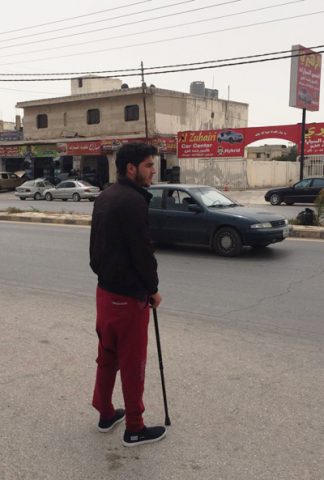Grenade strike at a football game left 15-year-old Abdusalaam handicapped and changed his future
I was in Mafraqi, on the Jordanian side near the Syrian border, watching as people arrived at a prosthesis clinic to be treated. Many of the arrivals had lost a leg or an arm in the war across the border. They had been brought across the border to receive treatment, since there was none on offer in Syria.
There, amongst the crowd, was young Abdusalaam Hariri, walking with a stick. We sat by the clinic wall to talk. The sad-faced young man told me his story. A story I would not wish on anyone.
In 2015, when Abdusalaam was 15 years old, he was playing football in the nearby city of Daraa on the Syrian side. A rocket or grenade struck in the football field – next to the boys playing football. It changed the young man’s future in an instant.
He had been forced out of school the previous year, when fighting destroyed the schools in the area. Life was filled with constant fear and idle time – no school, nothing to do. The youth played football, with nothing else to do. And they were tired of being afraid all the time. The war had already numbed their minds with its constant threatening situations.

Abdusalaam Hariri. Photo: Olli Pitkänen.
The explosion destroyed one of Abdusalaam’s legs completely and the other in part. The leg was amputated under dreadful circumstances at a clinic built in a car garage without the proper hygiene level. The local doctor did his best without proper facilities or equipment. There was little pain medication. The young man lost his leg.
Abdusalaam struggled at home in terrible pain for over a month. Finally, as his pain and suffering only increased, his brothers and family decided to take the boy to Jordan to receive proper treatment. There would be aid organisation clinics and hospitals there.
Amidst the fighting, Abdulsalaam’s brothers carried him across the fields on a dangerous journey to the border. There was constant firing going on, and the government troops randomly dropped barrel bombs into villages, with gruesome consequences. Even though the journey was short, it took the whole day.
On the Jordanian side, Abdusalaam received proper treatment, and he was operated on twice. After that, a long course of physical therapy began.
As we talked in the sand dust raised by the wind, the young man told me he dreamed of studying and getting a better prosthesis. He had seen the kind of prostheses available in Europe online, and he dreamed of one. Here, refugees are only offered the basic models. So far, he has not been able to study, with the schools farther away and his treatments keeping him in Mafraqi.
And like almost every Syrian refugee, Abdusalaam said before we parted: ”I want to go back to Syria. I wish everything went back to the way it was and I could continue my life at home. At home, life would be better, even without a leg.”
In 2017, Finn Church Aid, in cooperation with Handicap International, helped a total of 186 handicapped persons receive a piece of equipment to aid mobility, and 124 persons to receive a prosthesis. Many of them were handicapped in the Syrian war. 30 percent of the recipients were poor Jordanians.
Olli Pitkänen
The author served as Finn Church Aid Regional Development Manager in the Middle East up until May 2018. The blog text is the third part in the #YouthOnTheMove series.